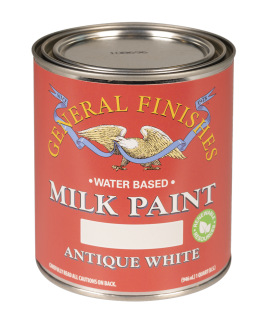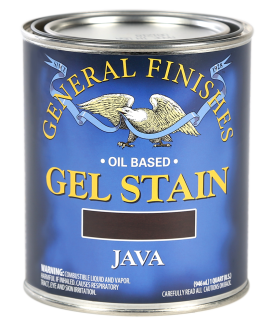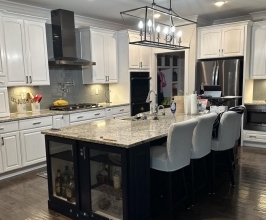GF advises extra care and prep when applying any finish over laminate surfaces because they are specifically designed not to mar and therefore they are not very "sand-able", making adherence difficult.
In addition to this non-permeable surface factor, General Finishes Gel Stain is an oil-based product, and it is more difficult to obtain proper drying characteristics over a dense manufactured surface such as laminate. Gel stains, as all wood stains, were formulated to go over raw wood which has an "open" surface and can absorb some of the stain.
Customers have reported the successful use of Gel products over laminate surfaces. Here are two techniques:
- Using Dark Chocolate Milk Paint as a Base under Gel Stain (Dark Chocolate Milk Paint was formulated to mimic the color of Java Gel Stain)
- Several techniques using only Gel Stain/no paint or primer
SOME NOTES:
- If you can abrade the surface by sanding, you will increase your chances of success. If you choose to proceed, test for adhesion on a hidden area of your project before getting started.
- If you are applying GF Gel Stains over existing "sealed" finished wood or any impenetrable surface, TRIPLE OR QUADRUPLE the drying times of all the finishes used because the stain cannot soak into the surface.
- De-Glossers: GF does not recommend the use of a de-glosser as a REPLACEMENT for prep sanding and cleaning. They are sold by manufacturers that advocate that it is ok to cover up dirt and grime, which can create a problem. GF feels that appropriate cleaning and sanding delivers a better result and saves money.
- If you have physical issues with the labor of sanding, at least clean the project before using a de-glosser.
APPLYING GEL STAIN DIRECTLY TO LAMINATE:
- “Power clean” by scrubbing with a solution of water and a strong detergent such as Dawn or Spic & Span, using a Scotch-Brite pad. Rinse thoroughly.
- Then follow with a second scrubbing with a 50:50 mix of denatured alcohol and water, also using a Scotch-Brite pad. Let dry completely.
- Sand with a power sander. 150-grit followed by 180-grit sandpaper. (some users reported using 220 grit sandpaper). Wipe off the dust.
You can apply Java Gel Stain several ways:
- With a roller for a painted effect (from ABHall), painting on with a chip brush followed by pouncing with a plastic bag for a textured effect.
- Brushing on followed by a mineral spirit dry-brush technique. See mineral spirits dry-brushing technique in this video.
- Apply a slip-coat of mineral spirits first using a chip brush to give you more open time. While the mineral spirits is still wet, paint the Gel Stain on using a chip brush. While the Gel Stain is still wet, GENTLY smooth out the surface with a folded blue shop towel going in the direction of the grain.
Tip from Andrea Allred: Dry brush Gray Gel Stain on top the next day for a weathered look. - Paint on two coats of Gel Stain, letting each coat dry 72 hours. Create the look of faux wood by sanding each coat lightly.
- Allow the Gel Stain to DRY 72 HOURS. If it is still tacky and cool to the touch, let it dry for days. Let it dry, let it dry, let it dry. Lack of dry time over existing surfaces is the number one reason for Gel Stain failure!
- Seal with 3 coats of topcoat, allowing triple dry time. As previously stated, you can use Arm-R-Seal over dark colors and High Performance over light colors.
NOTE: When using fine wood finishes, water and spills must be wiped up in a timely fashion. If this a high-use area near a sink, consider replacing the countertop instead. If this a low-use area such as a bedroom dresser that needs a tune-up, you will be fine.
ADHESION TEST:
Test your entire procedure (preparation to topcoat) on a hidden area first and let it cure for 7-10 days. Then further test the finish by duplicating normal wear and tear: washing, scrubbing, scratching, etc. to make sure the finish bonds to the surface.

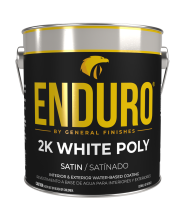 Enduro Water-Based Tintable 2K White Poly
Enduro Water-Based Tintable 2K White Poly
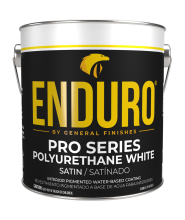 Enduro Water-Based Pro Series White Polyurethane
Enduro Water-Based Pro Series White Polyurethane
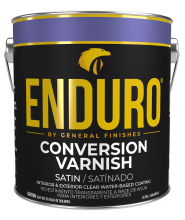 Enduro Water-Based Conversion Varnish
Enduro Water-Based Conversion Varnish
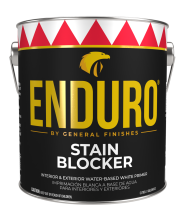 Enduro Water Based Stain Blocker Primer
Enduro Water Based Stain Blocker Primer
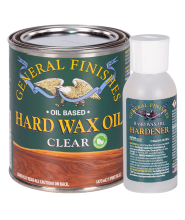 Hard Wax Oil & Hardener
Hard Wax Oil & Hardener
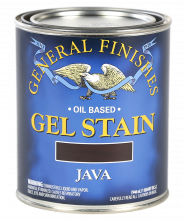 Gel Stains
Gel Stains
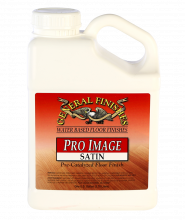 Pro Image Flooring Topcoat
Pro Image Flooring Topcoat
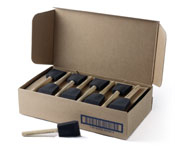 Jen Poly Brushes
Jen Poly Brushes
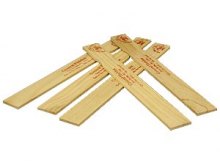 Stir Stix
Stir Stix
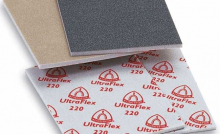 Ultraflex Softback Sanding Sponge
Ultraflex Softback Sanding Sponge
